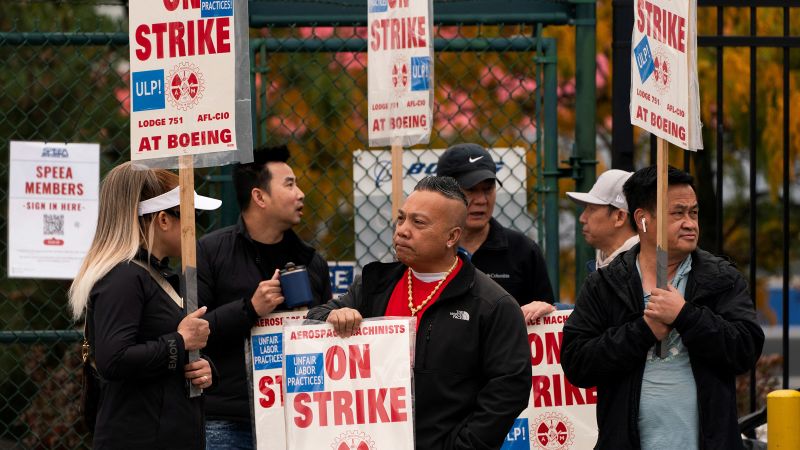Boeing is facing significant losses as a result of a one-month-long strike by the International Association of Machinists, with costs reaching nearly $5 billion. The strike has resulted in a halt to production at the company’s production facility in Everett, Washington, impacting workers, shareholders, suppliers, Seattle-area businesses, and Boeing customers. Suppliers have seen losses totaling $900 million, while non-Boeing Seattle workers have lost $102 million. Boeing customers, the airlines, have also felt financial impacts, with losses reaching $285 million globally.
The strike has added to the challenges Boeing has faced in recent years, including fatal crashes, increased regulatory scrutiny, and the guilty plea to defrauding the FAA over the failure to disclose a system upgrade to its 737 Max fleet. This resulted in fines of nearly $1 billion. The company is now facing layoffs of 10% of its workforce, about 17,000 employees, over the next several months. The CEO of Boeing, Kelly Ortberg, acknowledged the difficulties the company is facing and the challenges ahead.
Negotiations between Boeing and the striking IAM workers broke down after two days of federally mediated talks, with the union rejecting the company’s proposals. Despite being far apart on key issues, IAM President John Holden believes there is a deal to be made. He is confident in the strength of the strike fund to support members for as long as necessary to reach a reasonable agreement. However, Holden acknowledges the broader economic impact of the strike, affecting the GDP and the aerospace supply chain.
The strike by the International Association of Machinists against Boeing has been ongoing for one month, resulting in significant financial losses for the company and its stakeholders. The strike has halted production at the company’s facility in Washington state and has impacted suppliers, Seattle-area businesses, and Boeing customers worldwide. The company is also facing layoffs of 17,000 employees as it navigates the challenges brought on by the strike and other recent issues, including fatal crashes and regulatory scrutiny.
Despite the breakdown in negotiations between Boeing and the striking IAM workers, both sides believe there is a deal to be had. IAM President John Holden remains confident in the strength of the strike fund to support members during the strike, but acknowledges the broader economic impact of the ongoing labor dispute. The longer the strike continues, the harder it will be to restart production and get back to normal operations, potentially impacting the GDP and the aerospace supply chain.
The strike by the International Association of Machinists has placed Boeing in a difficult position, both financially and in terms of its reputation. Facing billions of dollars in losses, the company is working to navigate the challenges brought on by the strike, as well as other recent issues such as fatal crashes and regulatory fines. Despite the difficulties, both Boeing and the IAM workers are hopeful that negotiations will resume and a deal can be reached to end the strike and minimize the impact on the broader economy.













